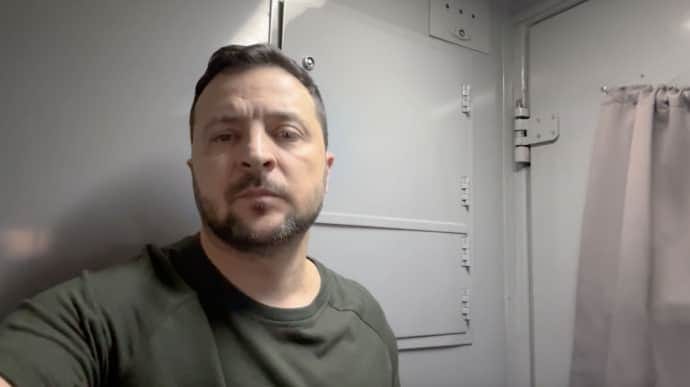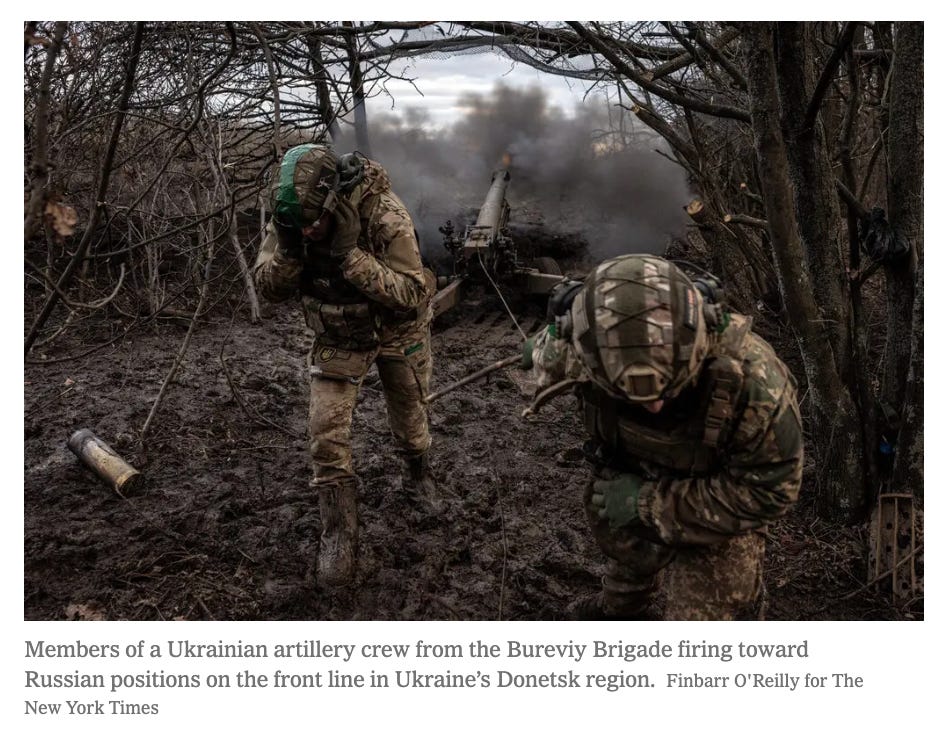"Avdiivka Is Done – 4,000 Soldiers Without Evacuation" - Military Summary
"Zelensky Heads to Berlin and Paris to Shore Up Support as U.S. Wavers" – New York Times
With regard to the collapsing situation in Avdiivka, Ukraine whilst Zelensky is said to be currently conveniently abroad, I recommend watching Dima’s Military Summary video analysis posted Thursday, 15 February 2024.
Please note that this blog was drafted last Friday but due to personal circumstances I am just now publishing it to provide background information for the fall of the US, UK et al’s failed proxy war operation against Russia in Ukraine.
Please note that this post is too long to be read in its entirety by email.
SnowStorm | Avdiivka Is Done | 4,000 Soldiers Without Evacuation. Military Summary For 2024.02.15
THE MAP: https://dev.militarysummary.com
Store: https://www.militarysummary.store/
Google doc: https://docs.google.com/spreadsheets/...
Rumble: https://rumble.com/c/c-1613003
Telegram channel: https://t.me/militarysummary
Twitter: / militarysummary
Email: military.summary.info@gmail.com
The following update was posted on Dima’s Military Summary X profile Friday morning.
The active phase of the battle for Avdiivka is coming to an end. There are negotiations ahead, prisoners of war... a large number of prisoners of war. This will be a very important and revealing moment, which could create a very unpleasant case for Zelensky. After all, if a large number of soldiers surrender in the battle for Avdiivka, then why should the rest of the soldiers in other directions fight if they can also surrender.
Attempts To Escape From The Encirclement Turned Out To Be A Disaster.
Military Summary For 2024.2.16
PREMIERE: 11:30 AM GMT+3
Watch on YouTube:
Rumble (https://rumble.com/v4dq3u6-16020204.1111.html…)
Odysee (https://odysee.com/@Military.Summary:c/16.02.2024-(Morning):3…)
Military Summary Map (https://dev.militarysummary.com)
For further military and geopolitical analysis regarding the collapse of the US, UK et al backed Zelensky’s last stand in Avdiivka, I also recommend listening to Alexander Mercurus’s video which was originally live streamed February 15th.
Ukraine Disaster: Ukraine Avdeyevka Troops Surrounded, Fronts Collapse, Russian Missile Strike, Zelensky Abroad
With regard to reports that the Neo-Nazi Azov battalion have been seen fleeing what may well, hopefully be Ukraine’s last stand in Avdiivka, please note the following posts by University of Ottawa Political Scientist, Ivan Katchanovsk on Twitter/X.
Neo-Nazi Azov movement expanded from the one Azov Regiment to two brigades and one special unit during this war. Andrii Biletsky, the founder and the first commander of the Azov battalion in 2014 and the leader of neo-Nazi Patriot of Ukraine, which was transformed into the neo-Nazi National Corps party, during the war with Russia became the commander of 3rd Separate Assault Brigade of the Ukrainian Ground Forces. This brigade was created from veterans of Azov battalion and Azov regiment.
He stated in October 2023 that the Azov movement is united and includes these brigades and the Kraken unit: There is no separation.... So the entire National Corps is either in the Third Assault Force, or in the DSH somewhere, or in special forces, in the same “Kraken” and so on.... And now 90% of the National Corps is serving somewhere."
Pravda reported last Thursday night that Zelensky was off again on one of his (begging) tours.
Zelenskyy begins trip abroad and holds series of meetings
By Tetyana Oliynyk — Thursday, 15 February 2024, 22:31
SCREENSHOT: OFFICE OF THE PRESIDENT
On 15 February, President of Ukraine Volodymyr Zelenskyy has recorded an address from the train and said that he had held a series of meetings on the eve of his trip abroad: on the security architecture and the border situation with Poland.
Source: Zelenskyy's address
Quote: "Secondly, today I held several preparatory meetings in the run-up to our international activities. We are now on our way.
Important meetings with partners are planned. There will be new agreements. We are doing everything to make them effective for Ukraine, and I am sure it will be so. We are creating a new security architecture for our country that will help us not just here and now, but in the long run. And this is something that Ukraine has never had, although it has always needed it."
Details: The president also held a meeting on the border situation with Poland and instructed the prime minister of Ukraine to hold urgent talks with his Polish counterpart.
Quote: "We in Ukraine view what has happened and is happening to our citizens and Ukrainian cargo as an obvious violation of the principles of solidarity. Ukrainian grain on the asphalt is not just a few dramatic shots.
This is evidence of how emotions can become dangerous. We have to defend the good neighborliness and solidarity that are changing the history of the whole of Europe for the better."
Details: Zelenskyy noted that Ukraine and Poland should define a common attitude, in particular, to the import of Russian grain and other imports from Russia to the territory of European countries in order to protect our societies and, in particular, farmers, both Ukrainian and Polish.
The New York Times published Friday morning the following article which was behind their paywall but is now archived here.
President Volodymyr Zelensky of Ukraine is making a whirlwind trip through Berlin and Paris on Friday in a bid to shore up European backing at a critical moment for his country’s fight against Russia, with United States support wavering and Ukraine desperately in need of more arms.
Mr. Zelensky is expected to sign security agreements with Chancellor Olaf Scholz of Germany and President Emmanuel Macron of France during his visits to the two leaders’ capitals, before an expected appearance at the Munich Security Conference on Saturday.
European leaders have been scrambling to offer more support to Ukraine amid growing concerns that a $60 billion United States aid package, which passed the Senate, may yet be scuppered by Republicans in the House.
The security agreements are among a string of such commitments pledged by all Group of 7 members and several other countries to Ukraine at a meeting of NATO allies in Vilnius, Lithuania, last year, a move seen as an attempt to compensate for their reluctance to bring Kyiv quickly into the alliance.
The agreements are meant to provide Ukraine with sufficient security assistance to deter further Russian aggression — including deliveries of key weapons, training of troops and intelligence sharing — and to strengthen Ukraine’s financial stability and help it carry out political and economic overhauls.
Pavlo Klimkin, a former Ukrainian foreign minister, said the security agreements pledged by G-7 members were the best his country had achieved since gaining independence in 1991. But he noted that they do not commit allies to fight on behalf of Ukraine, and instead pledge only to help Ukraine in the event of future aggression.
Through these agreements, Mr. Klimkin said, Ukraine’s allies “will deliver what they can and when they can, which is fundamentally different from delivering what’s needed and when it’s needed.”
“Everything in these agreements will be delivered on the basis of political decisions,” he added. “That’s a big if.”
Ukraine is also in dire need of ammunition, particularly artillery rounds, before what security experts say could be a critical year for its fight against Russia. Ukraine needs an “ammunition bailout,” said Thomas Kleine-Brockhoff, an analyst at the German Marshall Fund in Berlin.
“Zelensky knows who his most important allies are right now — Scholz and Macron — but both have to take the next step,” Mr. Kleine-Brockhoff said. “The Europeans stand before a fork in the road: When and if the United States falls to the wayside as a financial support, can they step up?”
Since October, European Union countries and institutions have allocated nearly $5 billion in military, financial and humanitarian aid to Ukraine — more than three times as much as the United States has in the same period, according to the Kiel Institute for the World Economy. The total aid allocated by the bloc has exceeded that of the United States since August.
This month, European Union leaders pledged 50 billion euros, about $54 billion, in new aid to Ukraine.
Yet to fully replace American military assistance this year, according to the assessment by the Kiel Institute, Europe would still have “to double its current level and pace of arms assistance.”
Chancellor Scholz has been clear that even as Europe ramps up its efforts, it may be impossible to sustain Ukraine’s military campaign without American support.
“Let’s not beat around the bush: Support from the United States is indispensable for the question of whether Ukraine will be able to defend its own country,” Mr. Scholz said after a meeting with President Biden in Washington last week.
Germany, once widely criticized as a laggard on military support to Ukraine, is now second only to Washington in what it has supplied. In November, Berlin announced that it would double its support to $8.5 billion in 2024.
The chancellery is now pushing other countries in Europe to share the burden and offer more weapons deliveries, arguing that it cannot offer any more.
Smaller nations such as Estonia and Latvia, both of which feel threatened by neighboring Russia, followed suit with announcements last month of new military aid packages, including drones and artillery weapons. But there remains a large gap between European aid pledges and actual deliveries.
European Union countries and institutions have committed more than $150 billion in aid since Russia’s full-scale invasion began almost two years ago, but they have allocated only half of that amount, the Kiel Institute said. By contrast, the United States has allocated more than 90 percent of the $73 billion in aid it has pledged.
Last month, Britain, which is not a bloc member, was the first G-7 country to sign one of the pledged security agreements with Ukraine. It includes cooperation in the defense industry, as well as in cybersecurity and maritime security, and states that in the event of future aggression by Russia, both countries “will consult within 24 hours to determine measures needed to counter or deter the aggression.”
France, which has been criticized for sending too little financial and military aid to Ukraine, has tried in recent weeks to highlight its continuing support for Kyiv. Mr. Macron said last month that his country would send Ukraine 40 long-range Scalp missiles, which have proved crucial for striking deep behind enemy lines, as well as “hundreds of bombs.”
To meet Ukraine’s demands, France has also halved the production time for Caesar self-propelled howitzers and plans to produce 78 such cannons this year. France said it would donate 12 of those to Ukraine, while Kyiv has already bought six of them with its own funds. The French authorities hope that other Western allies will help pay for the rest.
Constant Méheut has covered France from the Paris bureau of The Times since 2020. More about Constant Méheut
Related posts:















